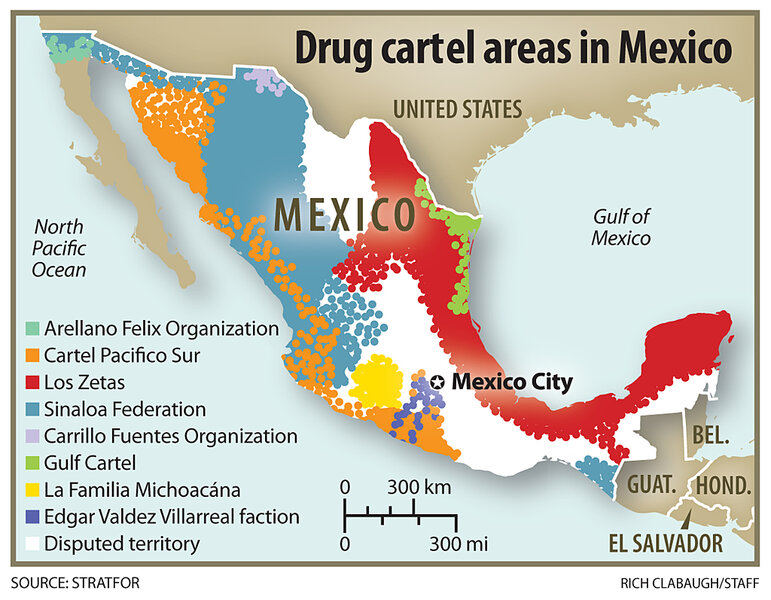Mexico drug war an 'insurgency'? US official's gaffe sparks US-Mexico row.
Loading...
| Mexico City and Boston
Leaking secret US documents, it seems, is not the only way to peer behind the polished veneer of official diplomatic statements and scripted press conferences.
Another way is simply to keep an ear open for off-the-cuff remarks, such as those made this week by US Undersecretary of the Army Joseph Westphal.
Mr. Westphal likened Mexico's drug war to an "insurgency" and suggested the US might need to send troops to Mexico and to prevent organized crime groups from taking over the country.
Mexico has condemned the remarks, which Westphal has retracted and apologized for, but they echo September comments from Secretary of State Hillary Clinton, who also compared Mexico's trafficking-threat to an "insurgency." President Obama immediately backed away from Mrs. Clinton's comparison then, just as Westphal immediately labeled his own words "inaccurate."
These diplomatic flip-flops, along with recently leaked US diplomatic cables from WikiLeaks, suggest that what Washington officials say in prepared speeches about Mexico is very different from what officials actually believe is happening south of the border.
'An insurgency right on our border'
Speaking Monday at the Hinckley Institute of Politics at the University of Utah, Westphal said he does not want to see America's “armed soldiers fighting an insurgency right on our border or just across our borders,” as Deseret News reported. "This isn't just about drugs and illegal immigrants. This is about the potential takeover of a government that's right on our border," he said.
His comments hit close to home in Mexico, as they suggest a future scenario where US troops might enter Mexican soil – a highly sensitive topic for a country invaded several times by the US.
“It is regrettable that [Westphal] articulated visions that have been overcome in the relationship with Mexico, which do not reflect the cooperation both governments have been building toward,” the Mexican Interior Ministry said in a statement late Tuesday. Mexican Foreign Minister Patricia Espinosa on Wednesday called Wesphal's remarks "totally unacceptable," even after he had apologized the day before in a statement posted prominently on the website of the US Embassy in Mexico City.
Such blunders strain relations between Mexico and the United States at a time when both nations need each others cooperation. Curtailing drug trafficking and bringing to justice those in Mexico who have killed Americans – such as two US teens this week in Ciudad Juárez – requires help from Mexican investigators and police, while Mexico has enlisted US aid in strengthening Mexico's weak judiciary and beefing up its armed forces.
Is corruption 'widespread'? Or is the issue 'tackled'?
Fighting the drug war, which has killed some 35,000 people since 2006, has until now seemed to be both countries’ most solid common ground. But Mexico has recently and repeatedly reproached US attitudes. Along with rebukes of Clinton and Westphal, last week the government of the Pacific Coast state of Jalisco took offense to a US decision to place an alert on its capital, Guadalajara, after drug gangs set up roadblocks in the city.
WikiLeaks has provided further examples of American doublespeak, highlighting the contrast between official support and private doubt of President Felipe Calderón.
A secret US cable written in January 2010 says President Calderón "has struggled with an unwieldy and uncoordinated interagency and spiraling rates of violence that have made him vulnerable to criticism that his anti-crime strategy has failed."
The cable continued: "Official corruption is widespread, leading to a compartmentalized siege mentality among 'clean' law enforcement leaders and their lieutenants. Prosecution rates for organized crime-related offenses are dismal; two percent of those detained are brought to trial."
Nevertheless, visiting Mexico last month, Clinton said Calderón had "tackled" Mexico's drug traffickers and "systemic issues" in Mexico’s institutions. "I think you can gather, I’m a fan," she said.
Doublespeak, in English and Spanish
Mexican officials, too, have been caught up in this doublespeak. According to another confidential US cable published by WikiLeaks, Mexican officials have in private admitted that the drug war is making less progress than publicly claimed.
In October 2009, according to another cable available at WikiLeaks.ch, Mexico's then-Undersecretary for the Interior Gerónimo Gutiérrez Fernandez "lamented the pervasive, debilitating fear that is so much a part of contemporary Mexican society" and "expressed a real concern with ‘losing’ certain regions.”






